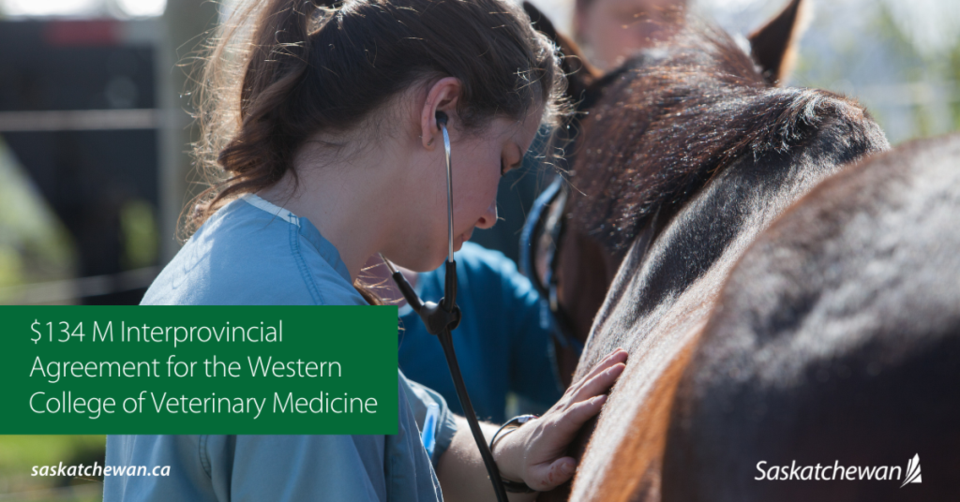Three provincial governments announced the renewal of their financial commitment to the University of Saskatchewan’s Western College of Veterinary Medicine (WCVM) on Sept. 9.
The British Columbia, Saskatchewan and Manitoba governments’ agreement with the University of Saskatchewan provides more than $134 million to the WCVM for the next five years. The college’s new interprovincial agreement is in place until 2025.
Notable in its absence is Alberta on that list. Alberta’s absence has led to a pilot project where students can pay the full freight for their schooling if they don’t get a subsidized slot.
Alberta established its own University of Calgary Faculty of Veterinary Medicine in 2005. In 2017, Alberta announced it would not renew its participation in the WCVM's interprovincial agreement after 2020, after over 50 years as part of the program.
At the time, then-Western College of Veterinary Medicine Dean Dr. Douglas Freeman said in a press release on Oct. 13, 2017, “Alberta’s decision to withdraw its financial support from the WCVM—more than $8 million per year—will certainly have an impact on the WCVM’s programs and services.
“However, one province’s decision doesn’t erase all that we have built and accomplished together in the past five decades. The WCVM will continue to be Western Canada’s veterinary college, providing quality veterinary education, research and clinical expertise to the region. We will not let the loss of support from one partner jeopardize our college’s value to all western Canadians.”
Alberta’s program only accepts Alberta residents, whereas the WCVM has allotments for students from each of its supporting provinces, of which Alberta used to be one.
The previous agreement allocated 78 slots per year – with 20 each for Alberta, Saskatchewan and British Columbia, 15 for Manitoba, two for Indigenous students and one for the northern territories.
The new Interprovincial Agreement maintains the same seat allotments for the remaining partners, however, Alberta’s former 20 slots have been expanded to 25 as part of a pilot project this fall. Those 25 slots have a residency requirement of students from Western Canada who meet the entrance requirements. However, since they are not subsidized, those 25 students will have to pay the full cost of their tuition. The University of Saskatchewan’s website notes, “Students admitted to non-Interprovincial Agreement seats will be required to pay a non-Interprovincial Agreement tuition rate of $55,000 per year in addition to regular tuition and fees. The estimated total is $68,277 (based on 2020-21 tuition rates).”
This rate is comparable to tuition rates outside of the country for veterinary colleges, according to WCVM.
The current tuition for each of the 58 subsidized seats is $13,277 per year.
The new agreement helps to ensure that Western Canada has a steady supply of veterinarians with in-depth knowledge of animal health and public health, as well as an awareness of the standards and issues facing livestock, fowl and fisheries producers and pet owners, the Saskatchewan government said in a press release.
Saskatchewan Advanced Education Minister Tiny Beaudry- Mellor said in a video posted on Facebook, “This agreement will help to ensure that Saskatchewan has a steady supply of highly-trained veterinarians to help service a robust livestock industry and ensure that pet owners like myself, have a trusted specialist who will provide compassionate care.
“The Western College of Veterinary Medicine is internationally accredited and known across the world for the quality and results of their research, and as a centre of clinical expertise. An excellent faculty of world-class facilities at the college has given graduating veterinarians a robust hands-on educational experience, preparing them for some of the tougher aspects of Veterinary Medicine.
“This agreement allows Saskatchewan, and our partner provinces, to specify student admissions priorities, so they are in step with our provincially-specific labor market needs. This will help provinces train veterinarians who are best equipped to return to their local communities, where they are in very high demand.
“By ensuring that Saskatchewan veterinary graduates have access to some of the best training and resources available, we believe that we can achieve some of our government's ambitious growth plan goals, which includes creating 100,000 new jobs and increasing live cash receipts to $3 billion,” Beaudry-Mellor said.
“The Manitoba government is pleased to renew our commitment to training in veterinary medicine and continue our long-standing partnership that provides high-quality education and training opportunities to Manitobans and helps meet labour market demand across the province,” said Ralph Eichler, Manitoba Minister of Economic Development and Training. “This is an important investment in Manitoba’s agriculture sector that aligns with needs under the Manitoba Protein Advantage Strategy. We need good veterinarians in place to help us practice safe animal welfare and keep growing animal agriculture in Manitoba.”
British Columbia Minister of Advanced Education, Skills and Training Melanie Mark said, “There is an increasing demand for veterinarians and veterinary research across Western Canada. This agreement helps us focus on equipping students from the western provinces with the expertise to return and practice in their home communities, where they are in demand.”
“The WCVM is built on collaboration, and its people and programs strengthen the University of Saskatchewan’s impact in everything from agriculture and animal health to comparative medicine and public health,” University of Saskatchewan Interim Provost and Vice-president Academic Melissa Just said. “We’re excited to see what it will achieve with the renewed support of its provincial partners and our university.”



